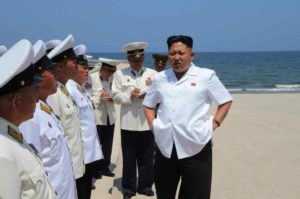by WorldTribune Staff, May 4, 2017
Driven into a corner by its over dependence on a frustrated China and a tough, hard-charging leader in Washington, the nuclear power and “Hermit Kingdom” North Korea is reviewing its options which do exist.
Neither China nor the U.S.-Japan-South Korea alliance wants to risk triggering a disastrous war on the Korean peninsula, and the U.S.-led bloc cannot allow further development of Pyongyang’s weapons of mass destruction (WMD).

With all major powers preparing for war, communist North Korea has reached out to Moscow which as capital of the Soviet Union sponsored Kim Il-Sung in the founding of what has emerged as the most ideologically-pure Stalinist regime.
The ouster of the conservative government of President Park Geun-Hye in South Korea following an extended impeachment showdown has dramatically increased political tensions and raised the prospect of a new leftist government in elections taking place this month. This major power play hold the potential to significantly weaken the traditional pro-U.S. alliance while strengthening the geopolitical posture of Beijing and Pyongyang.
“It has been a long-running strategy of North Korea to drive a wedge between the powers surrounding it and find room for maneuvering in the rift,” Choe Sang-Hun wrote for The New York Times on May 4.
Related: Russia, China quietly coordinate on N. Korea amid signs diplomats may return to stage, May 2, 2017
On April 30, North Korean Vice Foreign Minister Han Song-Ryol met with the Russian ambassador in Pyongyang and both sides “agreed to boost cooperation in various fields in line with the longstanding friendly relations,” KCNA reported. A North Korean delegation also visited the Russian Far East last month to discuss cooperation, according to the North Korean state-run news agency.
Analysts in South Korea have said the Kim Jong-Un regime is looking to import more Russian oil to lessen its fuel dependence on China. The North is also set to send more workers to Russia to earn hard currency for the regime.
As China threatens to enforce sanctions and consolidate its position in the event of regime change in Pyongyang, a rare pointed criticism of China was released by KCNA, warning that North Korea would continue its nuclear weapons program even if it risked losing a friendly relationship with its longtime ally.
“One must clearly understand that the DPRK’s line of access to nukes for the existence and development of the country can neither be changed nor shaken,” the commentary said. “And that the DPRK will never beg for the maintenance of friendship with China, risking its nuclear program which is as precious as its own life, no matter how valuable the friendship is.”
The commentary was attributed to a writer named Kim Chol.
In the North Korean state media, “a commentary by an individual writer does not carry as much weight as an official government statement,” Choe noted in his piece for the Times. “But such bylined commentaries closely follow an official script, and the regime in Pyongyang often uses them to voice its view indirectly.”
It is unusual for the state news media of North Korea to issue such a direct criticism of China, which accounts for 90 percent of its external trade and provides almost all of the country’s oil imports.
“China should no longer try to test the limits of the DPRK’s patience,” the commentary said, adding ominously, “China had better ponder over the grave consequences to be entailed by its reckless act of chopping down the pillar of the DPRK-China relations.”
KCNA published the commentary as a rebuttal to a series of commentaries and editorials in state-controlled Chinese news media, including Global Times, which criticized the North’s nuclear weapons program and called for Beijing to cut off oil supplies if the North conducted another nuclear test.
The KCNA commentary accused the Chinese news media of carrying “lame excuses for the base acts of dancing to the tune of the U.S.” and “calling for slapping harsher sanctions against the DPRK in order to avert a war which would bring danger to China.”
It also argued that China should recognize North Korea’s value as a buffer against American military influence in the region.
“China should acknowledge in an honest manner that the DPRK has just contributed to protecting peace and security of China, foiling the U.S. scheme for aggression by waging a hard fight in the front line of the showdown with the U.S. for more than seven decades, and thank the DPRK for it,” it said. “Some theorists of China are spouting a load of nonsense that the DPRK’s access to nukes strains the situation in Northeast Asia and offers the U.S. an excuse for beefing up its strategic assets in the region.”
The KCNA commentary was the North’s bitterest and most categorical criticism of China in recent memory, said Cheong Seong-Chang, a longtime North Korea analyst at the Sejong Institute, a South Korean think tank.
“It has been a long-established tradition between North Korea and China that even if they held grudges against each other, they didn’t voice them in public,” Cheong said. “This shows that the current North Korea-China relations are bad enough for both sides to break that tradition.”
